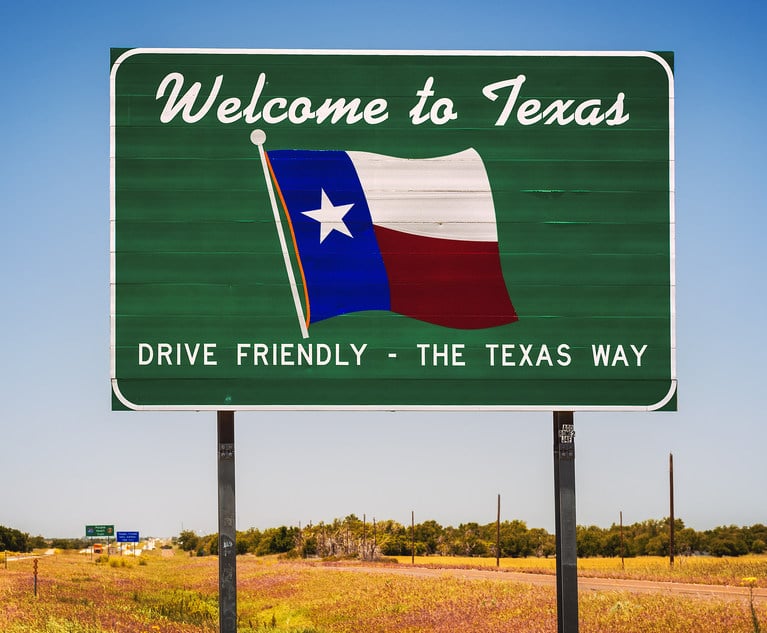 Matthew V. Topic of Loevy & Loevy. (Courtesy photo)
Matthew V. Topic of Loevy & Loevy. (Courtesy photo)Meet the Ex-Kirkland Partner Wielding FOIA for Mueller Records and More
"This is more than just a business or a practice," said Loevy & Loevy's Matt Topic, who says fee-shifting provisions have allowed him to take on over 200 FOIA cases.
December 19, 2019 at 03:25 PM
6 minute read
When Matthew Topic first left Kirkland & Ellis to launch his open-records practice at the Chicago plaintiffs boutique Loevy & Loevy in March 2014, it was just him and a single paralegal working part-time on three Illinois Freedom of Information Act cases.
A lot has changed since then. Working alongside five lawyers and paralegals, Topic is now juggling 200 FOIA cases, mostly in Illinois and federal courts, although he has been "dabbling" in FOIA cases in other states, such as Florida and Alabama.
He's waded into national-scale fights over records: Topic and his firm represented journalists who obtained the dashcam video showing a white Chicago police officer shooting a black teenager 16 times, as well as the records and notes used by Robert Mueller in his special counsel investigation into the Trump campaign's interactions with Russia during the 2016 presidential election.
Topic and BuzzFeed News scored a major victory last month when the U.S. Department of Justice agreed to release batches of those reports. But they'll only be released 500 pages a month every month for at least the next eight years, according to BuzzFeed News.
"There's just a rampant problem, especially DOJ and its components, about not even remotely meeting the guidelines under the statute," Topic said. "Getting into these cases where you have production schedules that go out five or 10 years."
Chris Hickman, BuzzFeed's senior counsel for media and intellectual property, said the major open-records victories the publication has won over the past year are "thanks in no small part to the effectiveness of Matt Topic."
Topic owes his high-volume practice to a particular quirk of FOIA statutes at the federal level and in states like Illinois: If a plaintiff prevails in court against a public agency over a FOIA matter, the public agency has to foot the bill for all of the attorney fees the plaintiff spent.
"This is why there's fee-shifting in the statute," Topic said. "I honestly believe I'm fulfilling what the [Illinois] General Assembly had in mind when they made for fee-shifting. No one was really taking advantage of it in a systematic, widespread way."
This means that Topic is flexible on fees. If his clients can pay, they'll pay. If they can't, "that won't be an obstacle to bringing a case." He said he would rather take on 20 cases where no one can pay than one case where a client could pay.
Take the city of Chicago, a frequent target of the journalists and transparency advocates Topic represents. Loevy & Loevy raked in $169,000 in attorney fees for FOIA actions against Chicago in 2018 alone, according to city records; the year before that it was $123,475.
"I consider this to be a personal mission. This is more than just a business or a practice," Topic said. "Every time the government improperly withholds records, it makes me angry, and I feel compelled to do something about it if I can."
His business model requires patience, because Topic and his team typically don't get paid until the case is resolved. He has cases pending for the next 10 years, and he thinks there's room to add more lawyers to his team to further increase the volume.
"We've shown that it works as a business model, or at least it works for us, and there's no reason continuing to increase the volume wouldn't work," Topic said.
It was during his tenure at Kirkland & Ellis, where he was a partner, that Topic began working on FOIA cases. Illinois lawmakers in 2009 updated the state FOIA to allow plaintiffs to recover attorney fees. It was because of that change that Topic, an intellectual property lawyer, developed the business model for his FOIA practice. That's how he landed at Loevy & Loevy in 2014.
A year after jumping to Loevy & Loevy, a firm known for securing multimillion-dollar jury verdicts and settlements in civil rights cases, Topic began working the biggest case of his career—an independent journalist was trying to obtain the video that depicted the death of 17-year-old Laquan McDonald by Chicago police officers.
In a major FOIA victory for Topic, a Cook County judge ordered the release of the McDonald video—which showed an officer shooting McDonald 16 times—in November 2015, creating a political earthquake whose reverberations can still be felt today in Chicago.
Topic doesn't consider himself a traditional media lawyer. Although he is the outside general counsel for the Chicago-based Better Government Association, a nonprofit watchdog organization that partners with news outlets in the Windy City, he doesn't handle a lot of defamation cases. And not all of his clients are journalists.
He admitted he doesn't have a good sense of the analytics of his practice—how many victories he and his team win at trial, how many hours they pour in. He said he is hoping to keep better tabs on those details in 2020.
Although Topic and his team have taken up FOIA cases in other states, they're not looking to extend the main reach of their high-volume practice outside of Illinois and the federal level. One obstacle to that expansion is that each state has a different FOIA statute with its own quirks.
"Every state, it operates a little bit differently, so there's a bit of a learning curve," Topic said. "That day may come where we start to look and say, 'Let's pick some other states and get people on the ground in those states.' Or maybe we look at partnerships…"
"Right now, there's so much more we haven't even done in Illinois and federal that, as we're constituted now, is pretty full-time," he added.
This content has been archived. It is available through our partners, LexisNexis® and Bloomberg Law.
To view this content, please continue to their sites.
Not a Lexis Subscriber?
Subscribe Now
Not a Bloomberg Law Subscriber?
Subscribe Now
NOT FOR REPRINT
© 2024 ALM Global, LLC, All Rights Reserved. Request academic re-use from www.copyright.com. All other uses, submit a request to [email protected]. For more information visit Asset & Logo Licensing.
You Might Like
View All
'Further Investment in Power' Will Drive Big Law Business—But What About Clean Energy Projects?
6 minute read
Legal Departments Gripe About Outside Counsel but Rarely Talk to Them
4 minute read
As Profits Rise, Law Firms Likely to Make More AI Investments in 2025

Law Firms Mentioned
Trending Stories
- 1Call for Nominations: Elite Trial Lawyers 2025
- 2Senate Judiciary Dems Release Report on Supreme Court Ethics
- 3Senate Confirms Last 2 of Biden's California Judicial Nominees
- 4Morrison & Foerster Doles Out Year-End and Special Bonuses, Raises Base Compensation for Associates
- 5Tom Girardi to Surrender to Federal Authorities on Jan. 7
Who Got The Work
Michael G. Bongiorno, Andrew Scott Dulberg and Elizabeth E. Driscoll from Wilmer Cutler Pickering Hale and Dorr have stepped in to represent Symbotic Inc., an A.I.-enabled technology platform that focuses on increasing supply chain efficiency, and other defendants in a pending shareholder derivative lawsuit. The case, filed Oct. 2 in Massachusetts District Court by the Brown Law Firm on behalf of Stephen Austen, accuses certain officers and directors of misleading investors in regard to Symbotic's potential for margin growth by failing to disclose that the company was not equipped to timely deploy its systems or manage expenses through project delays. The case, assigned to U.S. District Judge Nathaniel M. Gorton, is 1:24-cv-12522, Austen v. Cohen et al.
Who Got The Work
Edmund Polubinski and Marie Killmond of Davis Polk & Wardwell have entered appearances for data platform software development company MongoDB and other defendants in a pending shareholder derivative lawsuit. The action, filed Oct. 7 in New York Southern District Court by the Brown Law Firm, accuses the company's directors and/or officers of falsely expressing confidence in the company’s restructuring of its sales incentive plan and downplaying the severity of decreases in its upfront commitments. The case is 1:24-cv-07594, Roy v. Ittycheria et al.
Who Got The Work
Amy O. Bruchs and Kurt F. Ellison of Michael Best & Friedrich have entered appearances for Epic Systems Corp. in a pending employment discrimination lawsuit. The suit was filed Sept. 7 in Wisconsin Western District Court by Levine Eisberner LLC and Siri & Glimstad on behalf of a project manager who claims that he was wrongfully terminated after applying for a religious exemption to the defendant's COVID-19 vaccine mandate. The case, assigned to U.S. Magistrate Judge Anita Marie Boor, is 3:24-cv-00630, Secker, Nathan v. Epic Systems Corporation.
Who Got The Work
David X. Sullivan, Thomas J. Finn and Gregory A. Hall from McCarter & English have entered appearances for Sunrun Installation Services in a pending civil rights lawsuit. The complaint was filed Sept. 4 in Connecticut District Court by attorney Robert M. Berke on behalf of former employee George Edward Steins, who was arrested and charged with employing an unregistered home improvement salesperson. The complaint alleges that had Sunrun informed the Connecticut Department of Consumer Protection that the plaintiff's employment had ended in 2017 and that he no longer held Sunrun's home improvement contractor license, he would not have been hit with charges, which were dismissed in May 2024. The case, assigned to U.S. District Judge Jeffrey A. Meyer, is 3:24-cv-01423, Steins v. Sunrun, Inc. et al.
Who Got The Work
Greenberg Traurig shareholder Joshua L. Raskin has entered an appearance for boohoo.com UK Ltd. in a pending patent infringement lawsuit. The suit, filed Sept. 3 in Texas Eastern District Court by Rozier Hardt McDonough on behalf of Alto Dynamics, asserts five patents related to an online shopping platform. The case, assigned to U.S. District Judge Rodney Gilstrap, is 2:24-cv-00719, Alto Dynamics, LLC v. boohoo.com UK Limited.
Featured Firms
Law Offices of Gary Martin Hays & Associates, P.C.
(470) 294-1674
Law Offices of Mark E. Salomone
(857) 444-6468
Smith & Hassler
(713) 739-1250










